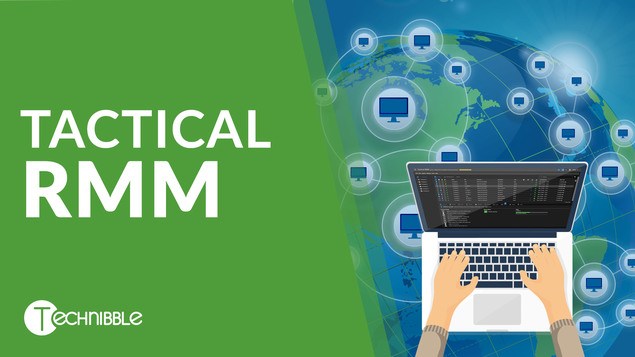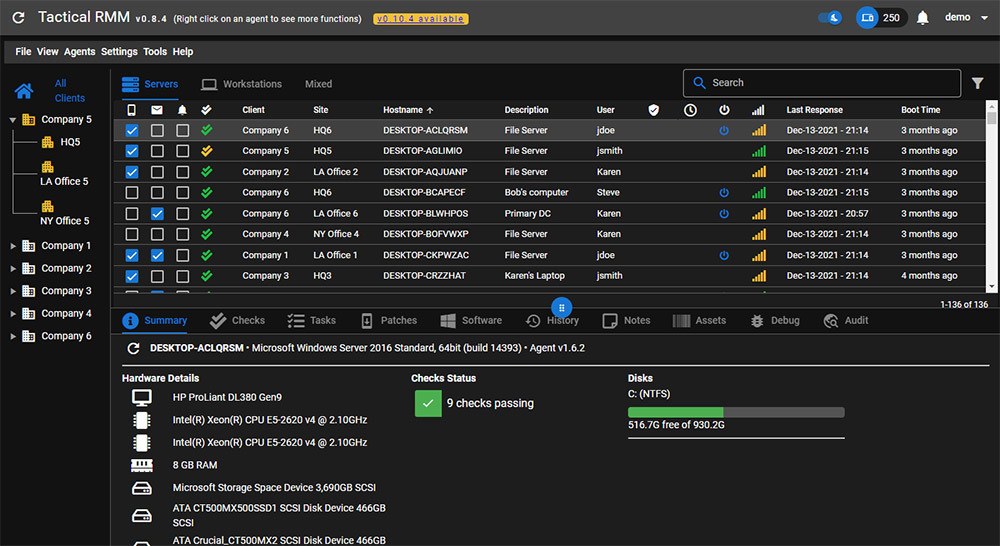- You are here:
- Home »
- Blog »
- MSP Software »
- TacticalRMM – A Free & Open-source RMM

TacticalRMM – A Free & Open-source RMM
There are many Remote Monitoring and Management (RMM) solutions on the market, but none of them are perfect. Some have become complex and bloated as feature after feature is added, but there is a new kid on the block. A free, simple, and open-source RMM focused on the basics.
What is TacticalRMM?
Tactical RMM is a free, open-source RMM built with Django, Vue and Golang. It has a Windows agent and integrates with MeshCentral.
It contains many of the features you would expect in an RMM, such as:
- Remote desktop control, which they do via MeshCentral
- Windows patch management
- Remote command and script execution (Powershell, batch and python scripts)
- Automated checks that can alert you via email or SMS (CPU, disk, memory, event log etc..)
- Hardware and software inventory
- Running tasks/scripts on a schedule
- Install software remotely via Chocolatey
- Service management
- Real-time Remote shell
- and more…

How Does it Work?
The RMM itself runs on a Linux VM or in a Docker container on the server-side. You need to be a little comfortable with Linux commands to get it installed.
One caveat is that there is currently no way to migrate your data/agents between the VM and the Docker version if you change your mind later.
On the Agent side, it currently supports Windows 7, 8.1, 10, Server 2008R2, 2012R2, 2016, and 2019. For code signing of the agents, you must be a GitHub sponsor with a minimum monthly donation of $50 USD.
I find the best way to get a feel of an RMM is just to spend some time experimenting with it. TacticalRMM provides a Live Demo that is pre-populated with some sample clients and computers.
Why The Project Is Interesting
As large RMM products continue to grow in functionality, they also add complexity. With so many features tacked on as an afterthought, it sometimes feels like they should start over from the ground up with the current features in mind.
One of the big benefits of Tactical RMM is that it is fresh, clean and capable. While it can’t compare to the feature-set of the big boys who have been building for a decade, it does the essential tasks well.
As it is open-source, it gives you a greater element of control. You are less at the mercy of price rises, feature removals or changes in terms. Or your RMM is being bought, sold, cancelled, or absorbed.
When MSP’s think of customisation, they often look at surface-level aspects like logos and dashboards, but true customisation is adjusting the RMM to match your workflow. Being open-source, we have the opportunity to fork TacticalRMM’s code-base and adapt it for our needs.
Some Issues
The elephant in the room is security, as RMM vendors remain a target. While many of us use open-source software without a second thought, an RMM is the “key to the kingdom”.
If you host on-premises, it doesn’t necessarily mean you are safer. You still need to have the skills to lock down your self-hosted implementations.
The “always available” RMM’s in the cloud are often targeted by hackers, but so are the self-hosted versions.
Open source also doesn’t necessarily mean it is more secure than a closed-source offering. While you can see the code, someone still needs to go through the code to look for any security issues. It appears there are plans for Tactical RMM to get a code audit which would enhance trust in it.
The project has two people coding for it. We don’t know much about them, their ability to handle issues out of their skillset, or how long they plan to continue this project. However, open-source software has had these issues for the last 30 years, yet the world still runs on it.
Support is king with anything in production, including open source products. The development of Tactical RMM has been fast, and the Discord group is helpful. That said, being free, they don’t owe you support on any quick timeline as you would expect with an expensive paid RMM.
Would I Use It?
It may not be suitable for you, but it is worth putting in your pool of RMMs to try out.
I am not ready to base my entire business and livelihood on this software, but I would consider it for something smaller, like looking after friends and family computers. New or smaller MSP’s might consider it to manage smaller clients.
It just needs some time to grow, so I want to give visibility to the project. Some of the best open-source software was born this way, and I think it could become a very viable choice when choosing RMM’s in the future.
You can check out TacticalRMM here.
Session expired
Please log in again. The login page will open in a new tab. After logging in you can close it and return to this page.

FYI, This is neither free nor open source. They’ve closed sourced the agent software and require a “donation” to access the signed executables.